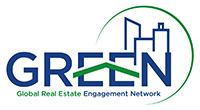Gecina: a top performer in the listed space
Gecina is a French-based company with one hundred percent of its portfolio located in France. The fund operates nearly 1.4 million sqm of office space and around 6,000 residential units. In addition, development plays a significant role with almost 3 billion euros of assets under development as of the time of this report.
As a leading French real estate firm with strong commitments to ESG, Gecina is one of the few funds presenting ambitious targets, supported by solid implementation plans. Among others, GREEN highly values Gecina’s disclosure of its ‘dynamic energy simulations,’ which is a form of a net-zero energy audit, and the disclosure of how the fund implements an internal carbon price.
Net-zero energy audit
Members of GREEN generally believe that funds and companies should be aware of how technically-feasible it is to get the portfolio to the net-zero goal. A net-zero technical energy audit reveals this information as it identifies practical changes in the operation that create reduction in energy consumption and carbon emissions. The results of an audit may or may not be financially feasible.
Gecina’s Dynamic Energy Simulations (DESs): Net-zero is possible
In the 2021 Integrated Report, Gecina shared information about DESs for the first time, a project funded by its Internal Carbon Fund. DESs helps drawing asset-level net-zero roadmaps by:
- Building net-zero trajectories through the determination of potential building improvements.
- Creating models for different building types to apply standard improvements to buildings that do not go through DESs.“
DESs have been scaled across Gecina’s portfolio, with cumulatively 31 DESs completed in 2021, 59 in 2022, and 74 in 2023. A notable conclusion from the latest DESs is that it is possible to achieve the net-zero stage under certain implementations, including electrification of heating and hot water, as well as thermal insulation of the building’s envelope.
Internal carbon price
Internal carbon pricing is a useful tool to show investors that funds are adequately prepared for transition risks. An actual carbon price affects the financial model and serves as an incentive for reducing emissions. Internal revenue generated from the carbon price can be reinvested in carbon-saving initiatives. Data from CDP reveals a growing adoption of carbon pricing, from 140 in 2014 to nearly 2,000 in 2020. Although real estate funds only represent a small portion of this adoption, the sentiment is changing.
Gecina’s adoption of carbon price
Gecina use an internal carbon tax of €100 per ton CO2 that feeds into an internal fund called the Responsible Carbon Fund (Carbon Responsable – CARE). Since the introduction of the internal carbon tax in 2018, 21 projects were supported by the internal carbon fund, including 3 in 2022. The 3 projects consisted of geothermal energy, testing the re-use of façade materials, dynamic energy simulations to drastically reduce emissions.
Sources
For more details, see Gecina, Universal Registration Document 2023
Questions about this best practices?
Do you have any questions about this best practices? Or do you want to know more about GREEN? We currently represents assets under management of approximately € 3 trillion, representing both asset managers and asset owners. Please contact Maaike Hof, co-CEO of GREEN to learn more about this not-for-profit collaborative engagement initiative for institutional investors, focusing on reducing climate risk in the real estate industry.

